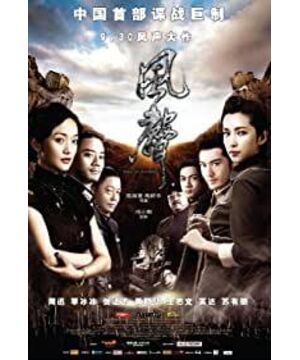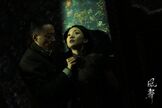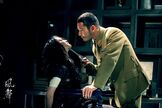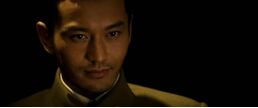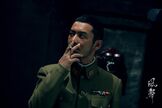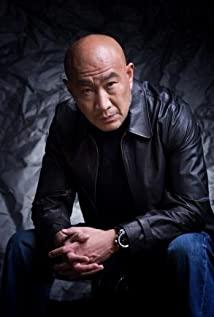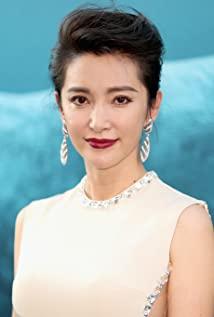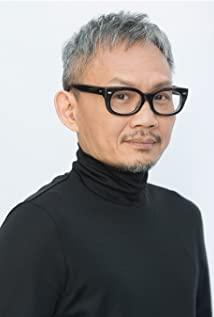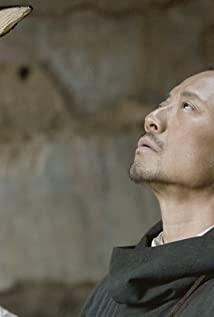The movie makes us turn our attention to Wang Jingwei's "pseudo-national" era, which was an era where black and white were reversed. "Chairman Wang" used the name of "curve to save the country" to advertise himself, but in his bones he was a traitor who was wagging his tail and begging for mercy. Unfortunately, "The Sound of Wind", jointly created by Chen Guofu and Gao Qunshu, fell into the same vicious circle. It tried to expand a new theme model with the opposite of revolution, which is a trace of extreme attitude reflected on the film. Undoubtedly, "The Sound of the Wind" is wrapped in the skin of a traitor, and the "revolutionary" soul in it is weak and pitiful, and can only be degenerated into a "curved patriotic" movie with empty form. If such a movie can be regarded as the main theme, Then it is extremely deceitful in nature. Anyone who has studied political textbooks knows that revolution is not a posturing (this is an empirical error), nor is it a lie (this is a right-wing capitulationist line), a real revolution is noble, pure, and detached from vulgar tastes, so Today, it would be against the common sense of revolutionary knowledge to attribute "The Wind" to a "patriotic movie".
In fact, the attitude of Gao Qunshu and Chen Guofu started from the first scene of the film. The high-ranking traitor played by Duan Yihong was killed, and then there were historical events such as the assassination of Japanese officers and the explosion of trains. I do not doubt these "historical facts", but In today's globalization of counter-terrorism, such images can easily make people associate revolutionary martyrs with terrorists. The film gave the "pseudo National Government" a festive and peaceful year-end atmosphere, and used the assassination attack of my underground party to destroy this atmosphere, which marked the film as "disharmonious" early. Of course, this cannot be attributed to the original work. After all, Marxism warns us to look at the problem with a critical eye, and accepting it in its entirety is "surrendering". The act of selling dog meat with sheep's heads in "The Sound of Wind" also belongs to a category of "siding on the wall". Combining such a violent gimmick with a lofty revolutionary ideal, the essence of its fooling people can be described as a cover. Of course, the foolishness of "The Sound of Wind" It was not made in one day. Behind Chen Guofu and Gao Qunshu hides a wretched figure. He is the ancestor of the Huyou people. His name is Feng Xiaogang.
The above is only the "character" of the film, even if it is committed and "Nanjing! Nanjing! "The same mistake, as long as the director shows personal pursuit and novel creativity, it still has a positive meaning in "pure space" that does not consider political significance. However, it is a pity that Gao Qunshu and Chen Guofu did not show anything to be proud of. 90% of the excitement of "The Wind" is due to the needle threading of the original work. . "The Sound of the Wind" relies on the story and takes the form. It completes a closed space drama with the story routine of "guessing bandits and spy" (from the perspective of a traitor). This model has long been misappropriated in the history of film. For many times, this kind of thinking of Agatha Christina has influenced the creation of suspense and detective films for many years in the future, and "The Wind" is just another copy of this detective mode. When it comes to the quality of the film, "The Sound of the Wind" obviously does not have the same in-depth exploration and changing expressiveness as Francois Ozon's "Eight Beauties" and Ning Ying's "Infinite Motion". It's the opposite of an ordinary detective movie: the police detective becomes a Japanese traitor, and the main culprit becomes an underground party member.
Gao Qunshu's progress in camera movement cannot hide his mediocrity in narrative. The game of guessing spy has been revealed from the very beginning (I did a good job of shielding in advance, and did not accept spoilers at all), Zhou Xun's high-profile hangover state Let him appear in other actors, so that our eyes fall on her and Li Bingbing early, and we can rely on intuition to judge that Zhou Xun is the so-called "old ghost". On the contrary, Zhang Hanyu, who is low-key, hides more deeply. This is a character similar to "A World Without Thieves". In his bones, he is more like the second director's slapstick to the producer. The vague problem is that Zhang Hanyu's performance is too low-key and shakes at the back end. When the burden turned the situation around, it seemed abrupt and unusual. "The Wind" is not as good as expected, the concealment is not enough to get rid of the relationship, and more is the lack of group dramas that are ready to break out. For the handling of the five suspects, the strategy adopted in the film is "going it alone", this kind of retreat is second The method reduces the difficulty of the script, and on the contrary, it finds a reasonable excuse for the SM paragraphs that add insults and corporal punishment to the film.
No one doubts that the gimmicks of "The Sound of the Wind" will be enough. Just the two scenes of "Huang Xiaoming Stripping Li Bingbing" and "Zhou Xun Fighting Hemp Rope" have already been shaken by shouting. Su Youpeng's sissy makes the film laugh. , unfortunately, his first turned into a corpse lying in the pool. What is certain is that when the first person died, Gao Qunshu had already planned to make a biography for our heroic communists. Of course, the comparison was between "faith" and "will". The general played by Yingda was a timid general. The cowardly confederates made their own decisions in the face of Wang Zhiwen's torture, explaining that the reactionaries and traitors were weak-willed; Zhang Hanyu, who came on next, bravely endured the cruel torture, and also attracted the attention of the perpetrators, which is equivalent to winning back for the Communists A glorious face. Zhou Xun and Li Bingbing staged a contest of emotion and reason. The latter went from a weak-willed woman to a progressive masses who understood the revolution. This process is far-fetched and contains too much didactic meaning.
Now it is very necessary to verify the cultural level of screenwriters, actors, subtitlers and others. To read "Nvhong" as "nvhong", the illiterate temperament is obvious. I don't understand how such a big film can make such a low-level mistake. , their behavior was just like Yi Nengjing's "feather fan scarf" was dismantled. Wang Zhiwen's character is very funny, I don't know how to make a side of Zhou Xun. "I really want to help you, but we don't have time." Such abrupt lines seem to create suspense, but he turned his head and smashed his own foot. , Wang Zhiwen is not an old gun, this scene and this line can only be left over from history. Another effect of this scene is to let Wang Zhiwen's character collapse. Under the circumstance that Huang Xiaoming could not suppress the scene, Wang Zhiwen was the central role of the secret agency. This collapse also announced the collective collapse of the dramatic conflict. The performances of Zhou Xun, Li Bingbing, Zhang Hanyu and others in the film are all maintained at a normal level, only Brother Vase Xiaoming has made some progress.
After all this, "The Wind" is just two words - flickering. Feng Xiaogang's ardent teachings are not included here. As a means of expressing respect for Gao Qunshu and Chen Guofu, "The Wind" has the same ending as "A World Without Thieves". The woman quietly listened to the man's story of the past. The man was still the same man, but the woman changed from the devoured Rene to Li Bingbing, who was suffocating and smoking. I admit that this ending is very funny, and I was completely overwhelmed by lightning. In the end, it was Uncle Feng who was squatting on a stool to supervise the army. In the end, he couldn't get rid of the essence of flickering.
View more about The Message reviews


